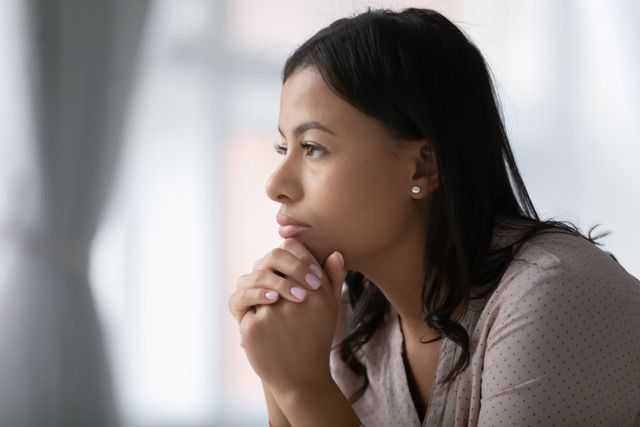Dr. Rebecca Schnatz helps us understand the causes of anxiety and offers important tips for finding relief.

As we make our way through the second summer of the COVID-19 pandemic, I want to take the opportunity to discuss something many people have been dealing with a lot over the past year: anxiety. I’ve noticed a profound increase in anxiety, depression, and mood concerns due to the COVID-19 pandemic, with varied effects on women’s lives. But there is also a lot that happens within a woman’s body that can contribute to anxiety.
As a women’s health professional, I spend a large amount of my time with patients discussing the various aspects of female hormones and their effects on day-to-day life. Having a better understanding of how hormones affect our worries and perhaps finding ways to control them may be especially helpful these days. Let’s take a look.
Anxiety can be induced during times of hormonal change
With regard to women’s health, anxiety is the most commonly diagnosed psychiatric disease, affecting nearly one in three women in their lifetime. Many women experience reproductive cycle mood symptoms during times of hormonal changes. These include premenstrual symptoms (PMS), postpartum “blues” and perimenopausal mood changes. These symptoms, although apparent, are not typically pathologic and are often transient. Should they evolve into more severe symptoms, patients may be experiencing premenstrual dysphoric disorder (PMDD), postpartum depression or anxiety, or a mood disorder outside the reproductive realm such as major depressive disorder or bipolar disorder.
Some of the specific hormones that play a role in increased or decreased levels of anxiety are estrogen, progesterone, testosterone, oxytocin, and stress steroids such as cortisol and adrenaline. The drop in estrogen and progesterone that occurs at the end of a women’s menstrual cycle may cause anxiety and other mood symptoms. This is similar to the drop experienced during perimenopause, the time during which your body makes the natural transition to menopause. Low levels of testosterone have also been linked to elevated worry or panic. Oxytocin, on the other hand, has been shown to reduce stress and anxiety.
The vicious cycle of anxiety and hormones
Your body produces stress hormones (cortisol and adrenaline) in response to a threat or fear, (either real or perceived.) These steroid hormones help you cope and prepare for action. If there is nothing to act on, you are left feeling anxious. Not only does stress hormone production cause anxiety in and of itself, but it can decrease production of testosterone, which can also cause anxiety. And since testosterone partially controls the release of cortisol, lowered testosterone levels can set off a rise in cortisol production. The combined effect is a vicious cycle of anxiety.
Behavioral changes can help you manage and prevent anxiety
Although it may come as no surprise, behavioral lifestyle changes are the first step to better controlling anxiety. Hormonal influences may make this difficult at certain times, but healthy changes will never hurt. Increasing sleep quality, reducing abuse of substances, and reducing stressors are helpful ways to cope with anxiety and depression symptoms. Exercise (especially yoga), limiting caffeine intake, smoking cessation, limiting alcohol use, meditation and relaxation have also been shown to be effective modalities.
There are also things you can do to boost production of oxytocin, the hormone that helps reduce stress and anxiety. Outside of childbearing, oxytocin is released during contact with loved ones and promotes relaxation and trust. Natural ways to boost oxytocin include showing generosity toward others, cuddling with a loved one, and petting an animal.
Ways your healthcare professional can help
Sometimes you may need more than behavioral changes to get relief from your anxiety. Talking with your healthcare professional will help determine if the symptoms you’re experiencing warrant psycho and pharmacologic therapy. Hormonal therapy is not approved to treat anxiety specifically, but a combination approach may be something to explore. Women also respond differently to hormonal birth control and can discuss contraception options with their OB/GYN.
Anxiety is a vast women’s health topic, and I have merely scratched the surface. Be sure to talk with your healthcare professional about any concerns you may have with how to manage elevated anxiety. We are always here to help!

About Dr. Rebecca Schnatz:
Rebecca Schnatz, DO, is an OB/GYN at the St. Francis office of Virginia Physicians for Women, where she considers herself lucky to provide care to women throughout their lives. After practicing for six years in Pittsburgh, PA, and Charleston, WV, Dr. Schnatz moved to Midlothian. She enjoys outdoor activities, traveling, soccer, cooking, and spending time with her husband and two young children. To learn more about Dr. Schnatz’s practice, go to vpfw.com.







